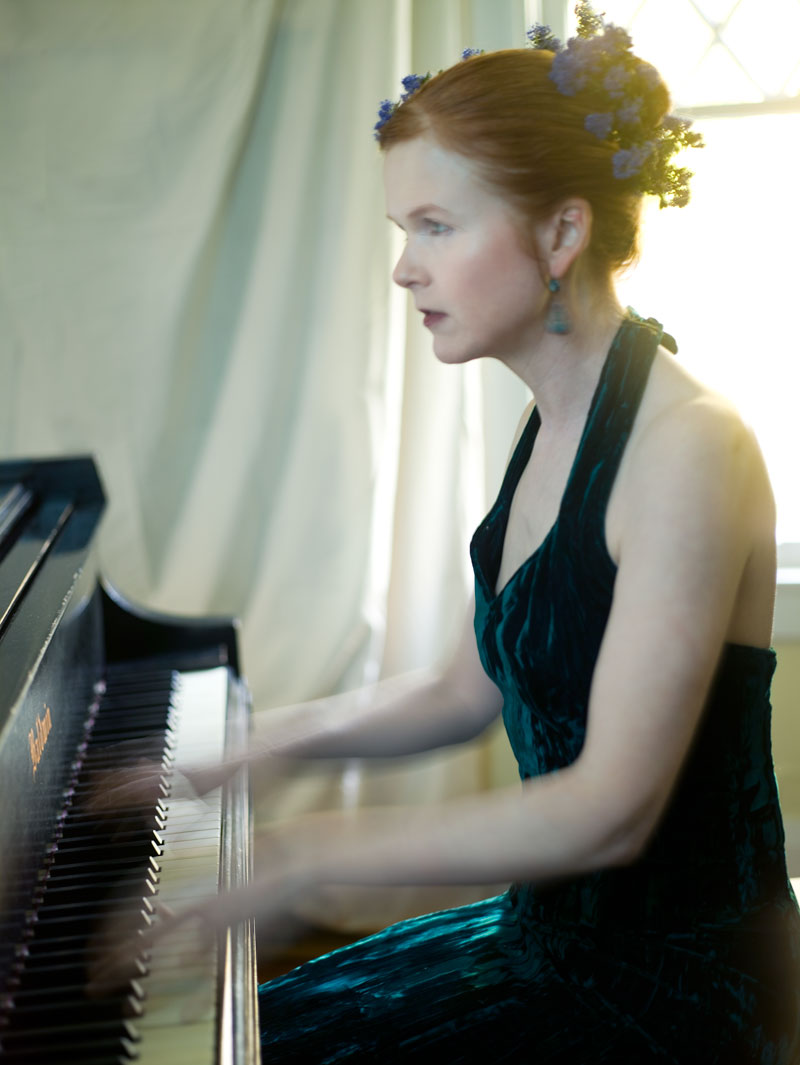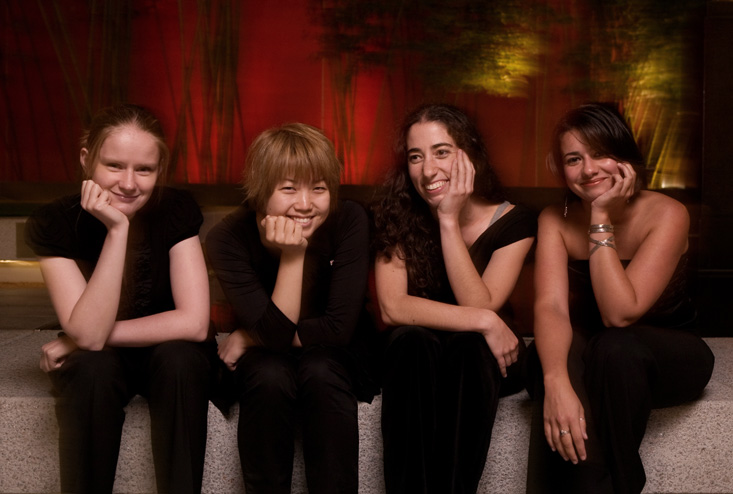Fifteen local chamber ensembles served up half-hour samples on Saturday, Sept 26 at SF’s Old First Church. In back-to-back performances from 12:30 to 8:30 p.m. we were treated to a variety of works, from Mozart to jazz. Sponsoring presenters introduced each group, exposing Bay Area venues along with the crème of local ensembles.
I heard nine of the fifteen groups and those five hours fairly flew by, perhaps due to the magic of eclecticism and bite-sized programs. Distilling each performance to highlights and punchy shorter works left us hungry for more.
And it was completely free. Which, of course, could lead to complications. And indeed, one of those complications occurred when a young man sat down next to me and proceeded to moan. But an odd transformation occurred: as he hunched, muttering and doodling on a donation envelope, he began to sway with the music, even to more provocative offerings, and occasionally privately conducted with his free hand. Live performance has the power to lift us out of our private pain, and, like health care, should always be free for those whom it can help the most.

I arrived mid-afternoon, missing several excellent acts: the baroque Voices of Music, the Laurel Ensemble, heard last May at Berkeley Chamber Performances with harpist Wendy Tamis, and Quinteto Latino, champions of the music of Mario Lavista and other modern Latino composers (reviewed in the Jan 10, 2008 Piedmont Post).
Earplay regulars Tod Brody and Peter Josheff played three of Allen Shearer’s seven Bagatelles. Combining synchronous passages with companionable altercations, percussive breaths turned to glides. The first movement sharply questioned, while the second slithered into awareness. Brody framed his flute passages as questions and Josheff answered with a clarinet whose restraint induced a curious inversion—the net of musical strands slowly emptied out, or drew me in until the sound held not sound but absorption. The third movement sat a middle ground, resolving the inner/outer balance as notes melted and ran up to sharp crests. Shearer ended with abrupt wit.
David Rakowski’s “Mento” for clarinet and piano held a thicker language, relying on patches of color rather than line. Karen Rosenak accompanied Josheff, bracketing his flourishes with careful chords and then grumbling in the basement. Elliot Carter’s “Canon for Three Equal Instruments” was short but rich, a pfeffernüsse in musical form. Its richness was tonal while the writing, a memorial to Igor Stravinsky, interwove lines of tart intervals. Brody inhabited each note, rolling the end of his flute for rounded sustains, while Ellen Ruth Rose shadowed reed and wind with a viola’s warmth. Earplay finished with Ed Martin’s 2008 “Trio for Flute, Cello and Piano,” anchored by cellist Thalia Moore. Written for a dense middle register, harsh phrases and unison chords gave way to cello fragments, which then expanded to dream-like arpeggios.
The duo Martha and Monica took the stage with Leoš Janáček’s Pohádka (Fairy Tale). Cellist Monica Scott accented the forward placement of the Czech rhythms as pianist Hadley McCarroll rippled through Chopinesque runs. Together, they delivered a breezy lightness to the music, which in less leavened hands could fall in the oven. This approach was also in evidence in their next piece, a cello arrangement of Debussy’s Chevaux de bois.
But when they delivered the Adagio movement of Beethoven’s Sonata in A Major they hit their stride: they embraced the music with full-fleshed phrases tensioned by a lovely delicacy.
New to the Bay Area, the Hausmann Quartet arrived three weeks ago for a residency at SF State under the tutelage of the Alexander String Quartet. After the obligatory Allegro movement of Mendelssohn’s String quartet No. 6, they gave a fine reading of Ned Rorem’s String Quartet No. 4. Like Rorem, this group is smart and irreverent. The slow middle movement, “Child Holding a Dove,” held a lilting melancholy, and was over too soon. “Acrobat on a Ball” was hip and athletic and filled with startling unison slides.
Sarah Cahill, Kate Stenberg, and Eva-Maria Zimmermann teamed up for more provocative modern works. These collaborators held an all-day Festival/Séance last year sponsored by Other Minds. Violinist Stenberg joined pianist Zimmermann in Alan Hohvaness’ Khirgiz Suite, a blend of hypnotic language and galloping rhythms.
Cahill, a pianist and champion of the avant-garde, joined Stenberg in Somei Satoh’s “Birds in Warped Time II.” Meditative and insistent, ineluctable and severe, this duet was one of many high points of the festival.
After Cahill’s surprisingly gentle forearm clusters in Henry Cowell’s Exultation, The Nice Guy Trio changed the pace with jazzy meditations. The young Picasso Quartet followed them, repeating the first movement of Mendelssohn’s String Quartet No. 6 with some serious bite. Their rich ensemble sound held a clarity that allowed the piece’s lyric strength to shine through, a testament to much thought and careful unity. First violinist Alisa Rose and violist Alexa Beattie propelled the group with power and poise, marking this as a group to watch. They continued with a surprising blend of classical and hoedown in David Garner’s String Quartet No. 1.
Kate Stenberg returned to lead the venerable Del Sol Quartet in Tania León’s “Agua de Florida” from Esencia. Having shown her breadth, here she was seductively rhythmic. Hannah Addario-Berry’s deep cello notes grounded the flowery runs and short phrases that lingered in the pauses, infusing “Essence” with their perfume.
Disconnected parts and tight dissonance gave Gabriela Ortiz’ String Quartet No. 1 an ungrounded and creepy quality, which Stenberg described as a “dense macabre feeling of distance.” Then they shifted mood with Gabriela Lena Frank’s “Chasqui” from Leyendas, fiery three-part pizzicato settling into a liquid violin soliloquy.
The Left Coast Ensemble supplied a threesome before their larger performance at Herbst Theater that same evening. After György Kurtág’s Bagatelles, they wowed us with a star-vehicle: flutist Stacey Pelinka performed Prokofiev’s Sonata for Flute and Piano with eye-popping technique. Her complete control allowed a warm and relaxed reading in even the fastest passages.
The Ives Quartet closed the festival with Quincy Porter’s richly harmonic String Quartet No. 3, which they are recording for the Naxos label. Porter alternated textured runs with satisfying resolutions, and at moments held the direct passion of Bloch.
This festival, with its many memorable moments, was like a buffet of desserts, and I wanted to keep going back for more.
—Adam Broner
A version of this article appeared in the Piedmont Post.
Photo top: pianist Sarah Cahill performed Henry Cowell and Somei Satoh at Old First Church. Photo by Marianne LaRochelle.
Photo bottom: The Picasso Quartet performed Mendelssohn, Ravel and David Garner. From left, violist Alexa Beattie, cellist Michelle Kwon, and violinists Alisa Rose and Natasha Makhijani. Photo by Picasso quartet.
